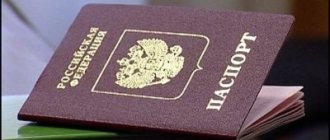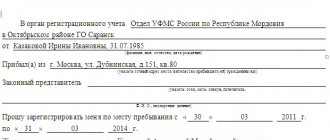Today, every person wants to obtain permanent registration in an apartment, and if permanent registration is more related to the issue of comfort and quality of living, then temporary is the minimum requirement of current legislation.
According to the law, every person who is on the territory of Russia must be registered at a specific address, and otherwise he cannot get a job normally, take full advantage of state services, including medical care, and also risks receiving a hefty fine from the migration service.
Dear readers! The article talks about typical ways to resolve legal issues, but each case is individual. If you want to find out how to solve your particular problem , contact a consultant:
8 (800) 700 95 53
APPLICATIONS AND CALLS ARE ACCEPTED 24/7 and 7 days a week.
It's fast and FREE !
But at the same time, registration also provides many advantages, although many do not know what registration in an apartment provides and why it is so important.
Why is it needed?
As mentioned above, in accordance with the law, the lack of registration of a person is considered a violation, and in connection with this, appropriate administrative penalties are imposed on the citizen. At the same time, for the citizen himself, registration is a way to obtain equal rights with other people to use the opportunities that modern society offers.
If we talk about what registration in an apartment gives, we can highlight the following:
- the opportunity to enroll your child in a kindergarten located in the area of registration, since registering a child without registration today is extremely problematic;
- the ability to choose schools according to territorial characteristics;
- receiving social benefits if the citizen meets the conditions for receiving benefits;
- receiving free medical care at a clinic or hospital located at the place of registration;
- confirmation of your place of residence for the employer if you want official employment;
- obtaining TIN, SNILS, individual entrepreneur, driver's license and health insurance policy.
Thus, regardless of what region of Russia a person is located in, he needs to register himself at a certain place of residence, and otherwise, at a minimum, various restrictions will begin to apply to him.
Only the owner of the property can register for a citizen, but in this case he does not provide him with any advantages regarding the disposal of this living space
Procedure for obtaining registration
Temporary or permanent registration takes place at the Federal Migration Service office. As part of the standard procedure, registration takes up to 3 days; if government agencies require additional checks, it can take up to 8 days.
To register in privatized housing with the FMS, you must provide the following package of documents:
- Completed application in the established form,
- Document - the basis for the emergence of rights to register at a given address - purchase and sale agreement, lease agreement, social tenancy agreement, written consent of the owner,
- Passport of a citizen of the Russian Federation,
- Statements from other homeowners stating that they have no objections to registration on their living space. In some cases, registration can be issued with the consent of only one of the owners registered in the apartment, for example, in the case of registration of minor children or immediate relatives (spouses, parents, children).
Forms and sample documents
A sample application for registration at the place of residence is available.
A form for filling out an application for registration at the place of residence is available.
A sample of owners' consent is available.
Submission conditions
This package of documents must be submitted no later than seven days after deregistration at the previous address; if permanent registration is maintained and received, the time period for submitting documents increases to 90 days. As already noted, violation of established deadlines leads to the imposition of penalties in the amount of 2-3 thousand rubles, and for Muscovites and residents of St. Petersburg - 3-5 thousand rubles.
Moreover, the fine will be paid not only by persons living without registration, but also by the owners of the apartment in which they live. After submitting documents within three days, the owners are returned with a note about the new place of registration or issued a certificate of temporary registration. Information about newly registered residents is entered into the house register.
Residence without registration at the place of residence
If a person is at his place of residence without registration, this will be considered an administrative offense, as a result of which all kinds of penalties will be imposed on the citizen, including a corresponding fine. It is worth noting that a person’s lack of registration is fraught not only for himself, but also for the person who provided him with living space.
In this regard, even for the owner of a premises that is rented to other persons, it is important for them to obtain at least temporary registration, and moreover, according to the law, it is he who must deal with the registration of his guests with the migration service.
Registration in municipal housing has its own characteristics
To register in municipal apartments, permission from the administration is required, an exception is made for close relatives (spouses, children and parents).
The package of documents for registration in this case will be impressive:
- Passports of registered citizens,
- Their departure sheets from the previous place of registration,
- Military ID for citizens liable for military service,
- Certificate from the place of previous registration about family composition,
- Marriage registration certificate when registering for married couples,
- Birth certificates, when registering children under 14 years of age,
- Application of registered persons in the prescribed form,
- Social tenancy agreement for an apartment at the place of registration,
- Consent of the responsible tenant and all persons registered in the apartment,
- Permission for registration of selected persons from the municipality.
IMPORTANT: when submitting documents for registration in municipal housing, all persons registered in it must be present; if someone cannot be present, then a notarized power of attorney must be issued from him to another person.
Upon registration, a citizen receives the following rights::
- For living in an apartment,
- For the use of apartment and common property,
- To receive documents at your place of residence, for example SNILS or TIN,
- For registration of individual entrepreneurship,
- To receive preferential payments and subsidies,
- The opportunity to enroll a child in a kindergarten or school on a territorial basis,
- The opportunity to get a more prestigious job,
- The opportunity to register a close relative or your child at your place of residence,
- The ability to give or not give consent when registering in the apartment of other people.
It is clear that temporary registration is more of a notification nature and gives its owner more opportunities than rights, in contrast to registration with ownership rights.
There is only one exception to this rule - registration in municipal housing gives not only the right to own and use the premises, but also to obtain ownership rights to this housing through participation in its privatization. In this case, it is quite possible to obtain ownership rights to housing in which only registration is available. Moreover, social housing tenants should think carefully before helping relatives and friends obtain registration in their apartment.
What exactly does registration in an apartment provide, what rights?
If a person registers in his own housing, which belongs to him as property, he has the right to independently make decisions about how to dispose of it, namely:
- register in it;
- register other persons in it;
- demand that the residents of his apartment be deregistered;
- rent premises, sell, donate or exchange them at your own discretion.
You don’t have to pay a fine for late registration if you present good reasons for what happened; it’s better if it is documented.
How to apply for temporary registration and what documents you will need for this, read here.
It is worth noting that, if there are grounds, the owner has the right to forcibly remove guests from the apartment, if there are good reasons for this, and today there are quite a lot of them. It is often possible to challenge forced eviction only if there are minor children living with their parents or one of them in rented housing.
If we talk about what rights registration at the place of residence gives, it is worth noting the following:
- he does not receive ownership rights to this housing or a lifelong right to use this premises;
- he receives the right to register his minor children at the specified address, but registration of other family members can only be carried out with the consent of the owner;
- if he invites any citizen who is not a close relative to stay, the owner can discharge him at any time;
- The rights of the owner are provided with maximum protection by the law, therefore he can be forced out of his home without the need to provide any other housing.
The homeowner has no obligations in relation to those persons who are registered in the housing he owns, unless we are talking about his close relatives.
Registration with ownership rights
There is no such thing as registration with ownership of residential premises today.
What it is?
This term implies that a person who registers himself at the place of residence, that is, permanent registration, acquires ownership of part of the apartment.
However, the constant registration of a person in his apartment causes a number of difficulties in managing it.
Permanent registration of a residential area can only be obtained with the permission of the owner of this area.
If he decides to sell the apartment or somehow transfer the right to dispose, own and use it (for example, as a gift), it will be possible to discharge a permanently registered person only through the court.
Here is a sample of the owner's consent to registration.
In addition, this person will have the right to register his minor child or other relatives in this living space. He can do this without the consent of the apartment owner.
These people will also not have any right to the apartment, but this will significantly complicate the alienation of the apartment.
For example, in order to forcibly evict and discharge minor children, it is necessary to involve the guardianship and trusteeship authorities, as well as the prosecutor, in the case.
In order not to risk this, the owner of the apartment can agree to issue temporary registration for a certain period:
- when this period expires, the resident will “automatically” lose the right to use and reside in this apartment;
- if he doesn’t want to move out, the court will evict him based on a lawsuit from the owner.
Permission for registration from the owner is required when registering his property. How to register through the court in a municipal apartment? See here.
Is it possible?
Is it possible to get a share in a residential property if there is a permanent residence permit in it? Yes! If this residential premises is still not owned by citizens, that is, it has not been privatized.
Privatization is the free transfer to citizens of residential premises that belong to the state.
Everyone who is registered in it has the right to receive a share in the residential premises. However, an adult citizen has the right to privatize for free only 10 times in his life.
Therefore, if one of those permanently registered has already used such a right, then he either does not participate or pays the market value of the share.
This rule does not apply to children under 14 years of age. If a child under 14 years of age participated in the program, then he did not lose his right.
For an apartment
You can also purchase a share in a non-privatized apartment on the basis of Law No. 1541-1. This law applies to any property owned by the state.
If the apartment is already owned, then the newly permanently registered citizen will not have the right to obtain ownership rights.
The apartment owner can only transfer ownership rights to the tenant on the basis of:
- purchase and sale agreements;
- gift agreements;
- life annuity agreements.
child
The child has an “automatic” right to registration at the place of residence of one of the parents. A simplified registration procedure applies at the mother’s place of residence. Only a statement from the mother is enough.
Registering with your father is accompanied by a number of difficulties. The mother must write her consent.
If the apartment is not privatized, then the child has an “automatic” right to receive a share in the apartment. If the apartment is already owned, then the child has no rights to it.
Here you can download a sample application for registration of a child, a sample consent of the mother for registration of the child with the father.
The owner is a stranger and a tenant
It is worth noting that if a person is registered in public housing, then in this case, in the process of privatization of this real estate, he can become a co-owner of this premises, if he has not privatized anything before in his life. It is worth noting that privatization will also be carried out by his child, if he was previously also registered in this premises.
That is why, if some distant relatives who came to work ask to register them in public housing, it is best to find out in advance whether they have minor children, since otherwise the above may happen, and it will be difficult to register them in advance impossible, since the rights of the child will be protected even in court.
Otherwise, a registered person can engage in any actions of a notification nature, that is, use all the civic opportunities and benefits that are provided through registration - place their children in educational institutions, receive subsidies, take out insurance or other documents.
If we compare the advantages of the owner and the tenant, it is obvious that the owner has much more of them if the premises are in his private property. The situation is different with municipal housing, since the state acts as the owner, and all people who are registered in the premises have absolutely equal rights with each other.
Registration in an apartment without the right to living space
A citizen, without being the owner of an apartment, can be registered with the permission of the owner and other officially residing citizens. What rights does a person registered in an apartment, but who is not the owner, have? What does permanent registration give him? According to the Civil Code, registration allows people to:
- register your minor children at the place of residence;
- receive a pension certificate;
- register yourself as an individual entrepreneur with a TIN;
- send the child to a preschool educational institution or school;
- receive cash benefits and other social benefits.
This is interesting: How to register in a hostel
Privatized housing
In order to register in a privatized apartment, you will first need to obtain permission from the person who is the owner of this housing. If the right to dispose of this property is assigned to several people, then in this case written permission must be obtained from each of them, since without the consent of at least one of the owners it will be impossible to register.
If a person who has ownership rights to the premises is going to register in privatized housing, then he does not need to ask permission to carry out this procedure from the other owners.
In the same way, if minor children are registered, their parents do not need to ask permission from the owners of the premises, and this applies even to those people who are not the owners of the property, but are simply registered in it. In the case of other close relatives, you will still have to negotiate with each of the owners for registration, regardless of their proximity.
At the moment, there are no rules or requirements in the current legislation that limit the number of registered persons in an apartment if it is privatized. Quite often, this nuance in laws is used by certain citizens who register other persons in their housing for a fee.
In practice, if a fraudulent registration is discovered during an audit, the property owner will ultimately have to pay a fairly large fine, and in some situations there is also the possibility of the owner being imprisoned for up to three years.
Is registration a right to property?
There is a categorical answer to this question - no. Being registered does not mean being the owner of the property. Since the right of ownership of residential space can only arise on the basis of a transaction, namely a gift, will, purchase and sale or privatization. All this is spelled out in detail in the Civil Code of the Russian Federation.
Thus, we can conclude that registration, or, in other words, registration is simply necessary for citizens in order to fully use government services.
Let's celebrate! Otherwise, the citizen risks receiving restrictions for full-fledged living in society. And this can negatively affect the quality of life of an unregistered citizen.
Didn't find the answer to your question? Find out how to solve exactly your problem - call right now: +7 (Moscow) +7 (812) 309-53-42 (St. Petersburg) It's fast and free!









